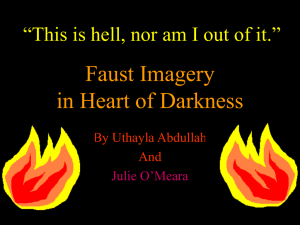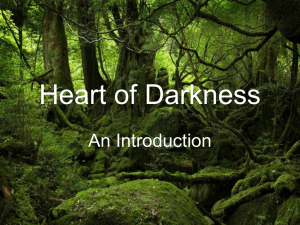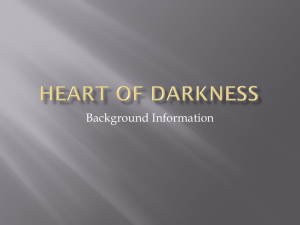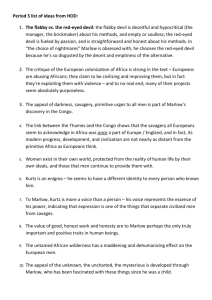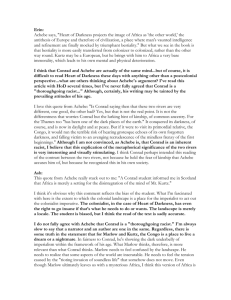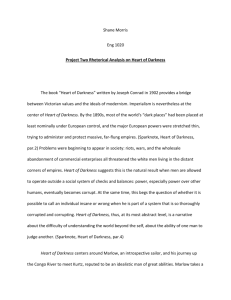notes and stuff.doc
advertisement
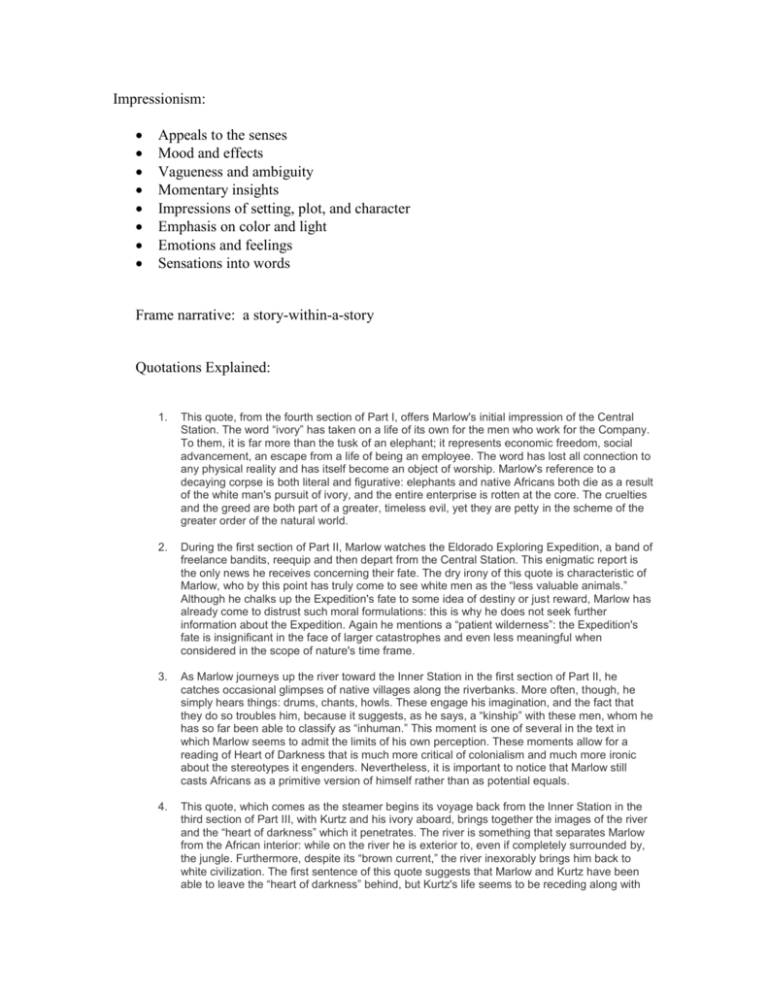
Impressionism: Appeals to the senses Mood and effects Vagueness and ambiguity Momentary insights Impressions of setting, plot, and character Emphasis on color and light Emotions and feelings Sensations into words Frame narrative: a story-within-a-story Quotations Explained: 1. This quote, from the fourth section of Part I, offers Marlow's initial impression of the Central Station. The word “ivory” has taken on a life of its own for the men who work for the Company. To them, it is far more than the tusk of an elephant; it represents economic freedom, social advancement, an escape from a life of being an employee. The word has lost all connection to any physical reality and has itself become an object of worship. Marlow's reference to a decaying corpse is both literal and figurative: elephants and native Africans both die as a result of the white man's pursuit of ivory, and the entire enterprise is rotten at the core. The cruelties and the greed are both part of a greater, timeless evil, yet they are petty in the scheme of the greater order of the natural world. 2. During the first section of Part II, Marlow watches the Eldorado Exploring Expedition, a band of freelance bandits, reequip and then depart from the Central Station. This enigmatic report is the only news he receives concerning their fate. The dry irony of this quote is characteristic of Marlow, who by this point has truly come to see white men as the “less valuable animals.” Although he chalks up the Expedition's fate to some idea of destiny or just reward, Marlow has already come to distrust such moral formulations: this is why he does not seek further information about the Expedition. Again he mentions a “patient wilderness”: the Expedition's fate is insignificant in the face of larger catastrophes and even less meaningful when considered in the scope of nature's time frame. 3. As Marlow journeys up the river toward the Inner Station in the first section of Part II, he catches occasional glimpses of native villages along the riverbanks. More often, though, he simply hears things: drums, chants, howls. These engage his imagination, and the fact that they do so troubles him, because it suggests, as he says, a “kinship” with these men, whom he has so far been able to classify as “inhuman.” This moment is one of several in the text in which Marlow seems to admit the limits of his own perception. These moments allow for a reading of Heart of Darkness that is much more critical of colonialism and much more ironic about the stereotypes it engenders. Nevertheless, it is important to notice that Marlow still casts Africans as a primitive version of himself rather than as potential equals. 4. This quote, which comes as the steamer begins its voyage back from the Inner Station in the third section of Part III, with Kurtz and his ivory aboard, brings together the images of the river and the “heart of darkness” which it penetrates. The river is something that separates Marlow from the African interior: while on the river he is exterior to, even if completely surrounded by, the jungle. Furthermore, despite its “brown current,” the river inexorably brings him back to white civilization. The first sentence of this quote suggests that Marlow and Kurtz have been able to leave the “heart of darkness” behind, but Kurtz's life seems to be receding along with the “darkness,” and Marlow, too, has been permanently scarred by it, since he is now ineradicably marked as being of Kurtz's party. Thus, it seems that the “darkness” is in fact internalized, that it is part of some fundamental if ironic “unsoundness.” 5. At the beginning of the final section of Part III, Marlow has just recovered from his near-fatal illness. His “nothing to say” is not reflective of a lack of substance but rather of his realization that anything he might have to say would be so ambiguous and so profound as to be impossible to put into words. Kurtz, on the other hand, is “remarkable” for his ability to cut through ambiguity, to create a definite “something.” Paradoxically, though, the final formulation of that “something” is so vague as to approach “nothing”: “ 'The horror!' ” could be almost anything. However, perhaps Kurtz is most fascinating to Marlow because he has had the courage to judge, to deny ambiguity. Marlow is aware of Kurtz's intelligence and the man's appreciation of paradox, so he also knows that Kurtz's rabid systematization of the world around him has been an act and a lie. Yet Kurtz, on the strength of his hubris and his charisma, has created out of himself a way of organizing the world that contradicts generally accepted social models. Most important, he has created an impressive legacy: Marlow will ponder Kurtz's words (“ 'The horror!' ”) and Kurtz's memory for the rest of his life. By turning himself into an enigma, Kurtz has done the ultimate: he has ensured his own immortality. Essay Answers: 1. This novel opens with Marlow noting that England was once one of the dark places of the earth. This can be read two ways. First, Marlow may mean that “Western” civilization is just as barbarous as African civilizations. This reading may contradict the European belief that white men are more “civilized” than their colonial subjects, but it hardly mitigates racist notions about primitive or degraded “savages”: it just means that Europeans are as “bad” as that which they have constructed as the lowest form of humanity. The second way to read Marlow's comment is as a reference to the historical precedent for colonization of other peoples. England, after all, was once a Roman colony. Again, this reading is more ambiguous than it seems. On the one hand, it implies that all peoples need a more advanced civilization to come along and save them; on the other hand, though, it also implies that the British would and did react to an exploitative colonial presence in the same way the Africans are reacting. The ambiguity and angst inherent in the statements this book makes about imperialism suggest that Achebe's condemnation is too simple. Additionally, moments of irony and narrative unreliability are scattered throughout the text, suggesting that Conrad does indeed provide a framework against which Heart of Darkness can be read as critical or ironic. At the same time, the fact that Africa is set up as a place where white men can go to have profound experiences and think philosophically could be read as reinforcing Achebe's claim that “Africa [is used] as [a] setting and backdrop which eliminates the African as human factor” in a troubling way. 2. The river is a space that allows Marlow to be simultaneously within and removed from the African interior. On the river he is isolated, a spectator. To discern his surroundings, he must watch and interpret the thin margin of land at the river's edge: from this he must guess at what lies behind and all around him. This inability to penetrate the continent's interior is a symptom of the larger problem with interiors and exteriors in the book. Marlow is unable to see into the interior selves of those around him; instead, he, like the doctor he visits before he departs for Africa, must base his knowledge on exterior signs. At the beginning of Heart of Darkness, the unnamed narrator discusses the fact that for Marlow the meaning of a story or an episode lies in its exterior rather than in any kernel of meaning at its heart. Throughout the book Marlow is indeed confronted with a series of exteriors, of which travel on the river is a prominent example. The caravan that goes from the Outer Station to the Central Station provides Marlow with his only opportunity for travel inland, and he finds there only a depopulated waste scattered with a few corpses: it tells him nothing. At the very least, travel by river lays before Marlow a surface to interpret. 3. In its treatment of imperialism and individual experience, Heart of Darkness is on many levels a story about ambiguity. Thus, Marlow's use of language is at the very least thematic. Throughout the book, words assume a bizarre, almost fetishistic power: “ivory,” for example, becomes almost more concrete than the elephant tusks themselves. The name “Kurtz” also takes on a life of its own, as it comes to stand for a set of legends and rumors rather than an actual man. Marlow becomes suspicious of words, as they threaten to overtake and distort the meaning they are supposed to convey. On the one hand, words fail to reflect reality adequately, and reality is often so paradoxical that the words don't exist to describe it; but, on the other hand, words sometimes take on an independent life of their own. Marlow's vague terminology, in addition to possessing a lyrical beauty, helps him to negotiate the dual threats of language.

